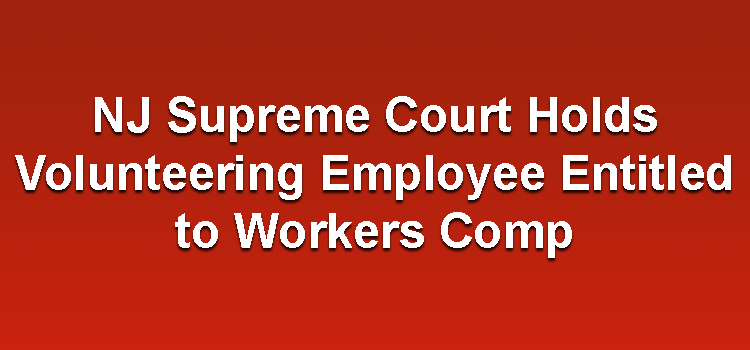
In Goulding v. NJ Friendship House, Inc., (A-48-19/083726) (Decided February 8, 2021), the Supreme Court of New Jersey held that an employee volunteering at an employer-sponsored event was entitled to compensation for her injuries under the state’s Worker’s compensation Act. According to the unanimous court, plaintiff Kim Goulding’s role at the event, serving as a cook, was the same as her role as an employee, and but for her employment at NJ Friendship House, Inc., Goulding would not have been asked to volunteer and would not have been injured.
Facts of Goulding v. NJ Friendship House, Inc.
Kim Goulding was an employee of North Jersey Friendship House, Inc. (Friendship House), a non-profit organization that assists individuals with developmental disabilities. She worked Monday through Friday as a chef/cook, and her responsibilities included cooking meals for, and teaching vocational classes to, Friendship House’s clients.
On a Saturday in September 2017, Friendship House hosted its first ever “Family Fun Day,” which it planned to hold as an annual event moving forward. The event was designed to provide a safe and fun environment with recreational activities for the clients of Friendship House and their families. Friendship House employees were asked to volunteer to work the event, but there were no consequences for those who did not. Goulding volunteered to work the event as a cook, her normal job at Friendship House.
On the day of the event, Goulding set up breakfast. While later preparing for lunch, she stepped in a pothole and fell down, injuring her ankle. Goulding continued to help the other cooks prepare lunch while keeping her foot iced and elevated. She left in the afternoon and did not participate in any of the games or activities at the event.
Goulding filed a claim for worker’s compensation and benefits. Friendship House maintained that Goulding was not entitled to relief because she was not working for Friendship House when the injury occurred. Under New Jersey’s Worker’s Compensation Act, an employee injured during a social or recreational activity generally cannot receive compensation for those injuries. However, the Act provides an exception to that general rule and expressly permits compensation “when such recreational or social activities [(1)] are a regular incident of employment and [(2)] produce a benefit to the employer beyond improvement in employee health and morale.”
The workers’ compensation court dismissed Goulding’s claim, determining that Family Fun Day was a social or recreational event and that the two-part test of N.J.S.A. 34:15-7 was not satisfied. The Appellate Division affirmed.
NJ Supreme Court Decision in Goulding v. NJ Friendship House, Inc.
The New Jersey Supreme Court unanimously reversed. It held that the injury Goulding sustained while volunteering at her employer-sponsored event is compensable because, as to Goulding, the event was not a social or recreational activity. The court further held that even if N.J.S.A. 34:15-7 was applicable, Goulding would still have satisfied the two-part exception set forth in that statute. As Justice Fernandez-Vina explained, Goulding’s role at the event, which was planned to be held annually, was the same as her role as an employee, and but for her employment at Friendship House, Goulding would not have been asked to volunteer and would not have been injured. Accordingly, Goulding’s injury was “a regular incident of employment.”
New Jersey Supreme Court first addressed whether Goulding’s volunteering at Family Fun Day was a social or recreational activity. According to the court, if an employer-sponsored event is designed with the purpose of benefitting the employer’s clients, and an employee volunteers to help facilitate the event, the event can’t be deemed a social or recreational activity as to that employee. Justice Fernandez-Vina wrote:
Whether an activity is social or recreational should turn on the employee’s role in the activity — whether she is participating as a guest or providing services for her employer at the event. If the employee is helping to facilitate the activity in the manner that occurred here, the event cannot be deemed a social or recreational activity as to that employee, and any injuries sustained by the employee while acting in that capacity should be compensated. That result accords with the liberal construction due the Act as “humane social legislation.”
The New Jersey Supreme Court also disagreed with the Appellate Division’s conclusion that Goulding failed to satisfy the two-prong exception established in N.J.S.A. 34:15-7. “Her role at the event, which was planned to be held annually, was the same as her role as an employee; but for her employment at Friendship House, she would not have been asked to volunteer and would not have been injured,” Justice Fernandez-Vina wrote. “Viewed in that light, Goulding’s injury was ‘a regular incident of employment.’”
In further support of the court’s decision, Justice Fernandez-Vina noted that Friendship House received a benefit from Family Fun Day beyond an improvement to employee health and morale. The event was not a closed, internal event for the Friendship House team. Rather, it was an outreach event designed to celebrate and benefit Friendship House’s clients, thereby creating goodwill for Friendship House in the community that could expand its fundraising opportunities in the future.
Because the court found that Goulding’s injuries were compensable, it remanded the matter to the worker’s compensation court for further proceedings.
